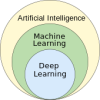“I do not believe that most advanced alien civilizations will be biological”
Source: Daily Magazine
While the scientific community debates Harvard astrophysicist Avi Loeb’s bold conjecture that our solar system has been visited by an advanced extraterrestrial civilization, philosopher Susan Schneider, who holds the Baruch Blumberg Chair, Library of Congress and NASA, preemptively upped the ante, suggesting that artificial intelligence exists out in the Universe, and it’s billions of years old.
“I do not believe that most advanced alien civilizations will be biological,” says Susan Schneider of the University of Connecticut and the Institute for Advanced Studies at Princeton .”The most sophisticated civilizations will be postbiological, forms of artificial intelligence or alien superintelligence.” Schneider is one of the few thinkers—outside the realm of science fiction— that have considered the notion that artificial intelligence is already out there, and has been for eons.
Schneider’s recent study for NASA, , Alien Minds, asks “How would intelligent aliens think? Would they have conscious experiences? Would it feel a certain way to be an alien?” Schneider, a cognitive scientist and philosopher, asks If we were to encounter extraterrestrial intelligence and consciousness…what might it “look” like and would we even recognize it?
Are Aliens Supercomputers?
While we are aware that our culture is anthropomorphizing, Schneider imagines that her suggestion that aliens are supercomputers may strike us as far-fetched. So what is her rationale for the view that most intelligent alien civilizations will have members that are superintelligent AI?
Schneider offers three observations that together, support her conclusion for the existence of alien superintelligence.
The Short Window
The first is “the short window of observation”: Once a society creates the technology that could put them in touch with the cosmos, they are only a few hundred years away from changing their own paradigm from biology to AI. This “short window” makes it more likely that the aliens we encounter would be postbiological.
The short window observation is supported by human cultural evolution, at least thus far. Our first radio signals date back only about a hundred and twenty years, and space exploration is only about fifty years old, but we are already immersed in digital technology, such as cell-phones and laptop computers.
Greater Age of Alien Civilizations
Schneider’s second argument is “the greater age of alien civilizations.” Proponents of SETI have often concluded that alien civilizations would be much older than our own “…all lines of evidence converge on the conclusion that the maximum age of extraterrestrial intelligence would be billions of years, specifically it ranges from 1.7 billion to 8 billion years.
We are galactic babies”
If civilizations are millions or billions of years older than us, many would be vastly more intelligent than we are. By our standards, many would be superintelligent. We are, Schneider says, galactic babies.
But would they be forms of AI, as well as forms of superintelligence? Schneider says, yes. Even if they were biological, merely having biological brain enhancements, their superintelligence would be reached by artificial means, and we could regard them as being “artificial intelligence.”
Not Carbon Based
But she suspects something stronger than this: that they will not be carbon-based. Uploading allows a creature near immortality, enables reboots, and allows it to survive under a variety of conditions that carbon-based life forms cannot. In addition, silicon appears to be a better medium for information processing than the brain itself. Neurons reach a peak speed of about 200 Hz, which is seven orders of magnitude slower than current microprocessors.
Source: Daily Magazine

































Leave a Comment
You must be logged in to post a comment.